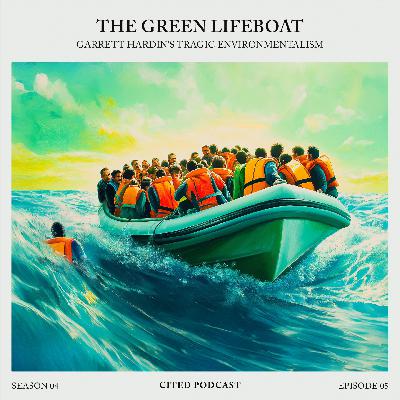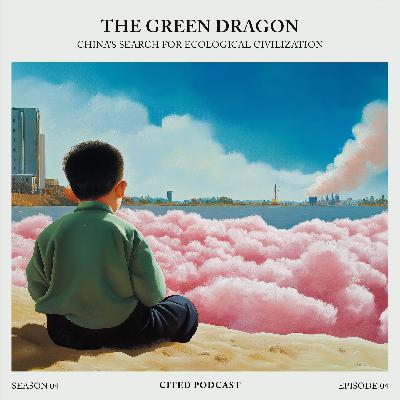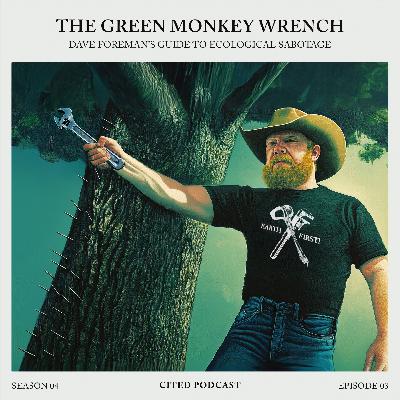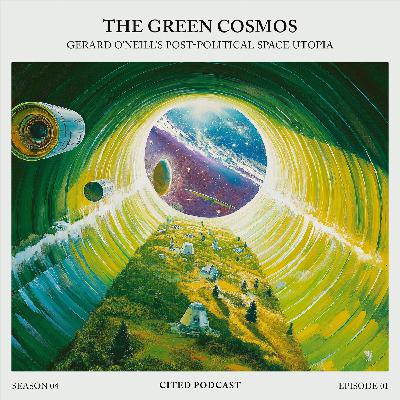Discover Cited Podcast
Cited Podcast

Cited Podcast
Author: Cited Media
Subscribed: 454Played: 9,581Subscribe
Share
© Cited Media Productions
Description
Experts shape our world. Sometimes for better, sometimes for worse. In every big story, you’ll find one; you’ll find a researcher, scientist, engineer, planner, policy wonk, data nerd, bureaucrat, regulator, intellectual, or pseudo-intellectual. Their ideas are often opaque, unrecognized, and difficult to understand. Some of them like it that way. On Cited, we reveal their hidden stories.
35 Episodes
Reverse
An ecologist in California claimed that the iron laws of nature locked humanity into destroying our environment. This meant that we must take drastic measures to rein in unfettered capitalism and the American habit of overconsumption, lest we deplete our common resources. That argument made Garrett Hardin one of the most influential and celebrated environmentalists to ever live. Yet, he had a tragic view of the world that turned his green dream into a green nightmare.
A former journalist and environmental campaigner named Pan Yue rose through the ranks of the Chinese Communist Party, championing the concept of “ecological civilization.” This green dream combines elements of traditional Chinese culture with eco-Marxism, suggesting a radical reorientation of humanity’s relationship to the natural world. Is the idea a serious alternative to sustainable development, as the CCP claims? Or is it just a cynical cover for eco-authoritarianism?
We're playing FOREST / GARDEN, the first episode of their fourth season. In the late 1970s, there was a radical environmental movement that rejected the idea that agriculture and biodiversity needed to be at odds. They called their movement permaculture. Permaculture dissolved the dichotomy between the natural and the artificial, or between the forest and the garden. However, its advocates didn’t always honour the roots they were pulling from.
We're beginning a mid-season break. If you're new to Cited, this is a good time to explore our large archive. On this episode, we re-post part one of our award-winning series, the (ir)Rational Alaskans.
A cowboy hat-wearing Goldwater conservative named Dave Foreman got religion and then founded the most radical environmental group of recent memory, Earth First! They dreamed of a ‘deep ecology’ that recognized the inherent value of nature, and they committed to protecting that nature at almost any cost. Yet, in putting the earth first, did Dave Foreman relegate humanity to a distant second place?
An Albertan oil man and a socialist policy wonk from Saskatchewan banded together to think up “eco-development,” a precursor to today’s sustainable development. This unlikely duo forged a global consensus at the United Nations, effectively codifying the reigning orthodoxy of liberal environmental governance. They told us that capitalism and sustainability are indeed compatible. Might that be the most utopian of all green dreams?
In the 1970s, Gerard O’Neill drew up detailed plans for large space colonies. The Princeton physicist claimed that these colonies could beam limitless energy back down to Earth, solving all our environmental problems. As climate change accelerates, O’Neill’s once-forgotten green dream has become influential again; many of today’s corporate space evangelists refer to themselves as “Jerry’s Kids.” For solutions to Earth’s problems, should we look to the stars?
Introducing our new season, Green Dreams. Starting September 9, 2025, with weekly episodes through October.
Trump scores big wins by taking cheap shots at experts. Now, some worry he could try to oust Fed Chairman Jerome Powell. The typical centrist position is to defend the supposedly impartial, apolitical expertise of such figures. Yet, we know that is not right. Is there a better way to imagine a better bank?
We're on break this week as everyone gears up for, and puzzles through, the results of this week's US election. However, we have an old Darts & Letters episode that is especially relevant to our ongoing season, the Use & Use of Economic Expertise.
Clinton's Third Way Democrats moved the party away from the unionized industrial labour that typically made up its base. Today, Clintonism is out, and Bidenomics in. Bidenomics was marketed as a political and theoretical break. Yet, beyond November 5th, Bidenomics might too be out. We look at shifting landscape of economic thinking within the Democratic Party.
We tell the story of the invention of the modern economy, or at least the idea of the economy. It starts with one measure: the GDP, or gross domestic product. Today, its a measure that dominates our politics. We have Simon Kuznets to thank for that. Yet, for Kuznets, the GDP was not what he hoped it would be.
In our finale, while the fisherman and fisherwoman of Prince William Sound hope for legal damages stemming from the Exxon Valdez disaster, Exxon fights back. In that fight, they marshal the most-respected psychologist of a generation.
A jury of ordinary Alaskans picks up the Exxon Valdez story. They muddle through the most devastating, and most complicated, environmental disaster in US history. How would they decide the case?
After the unprecedented Exxon Valdez oil spill, a jury of ordinary Alaskans decided that Exxon had to be punished. However, Exxon fought back against their punishment. They did so, in-part, by supporting research that suggested jurors are irrational. This first part, an Alaskan Nightmare, covers the spill and its immediate effects.
Early pollsters thought they had the psychological tools to quantify American mind, thereby enabling a truly democratic polity that would be governed by a rational public opinion. Today, we malign the misinformed public and dismiss the deluge of frivolous polls. How did the rational public become the phantom public?
In the late 60s and early 70s, Rochdale College was the heart of Canada's counterculture. It was widely condemned, before an ignominious end. But what really happened in the Hippie High-Rise?
A group of landholding elites waged psychological warfare on the El Salvadoran people, and oppressed them for generations. When a psychologist and Jesuit priest defended the rationality of the people against their oppressors, he paid the ultimate price.
The psychological establishment has long pathologized diverse forms of sexual identity and gender expression. In the mid-century, a brave movement of gays and lesbians fought back. But in the process, who did they leave behind?
Every protest movement has been dismissed as a mere ‘mindless mob,’ caught in a psychological frenzy. Where did this idea come from, and why does it last?























